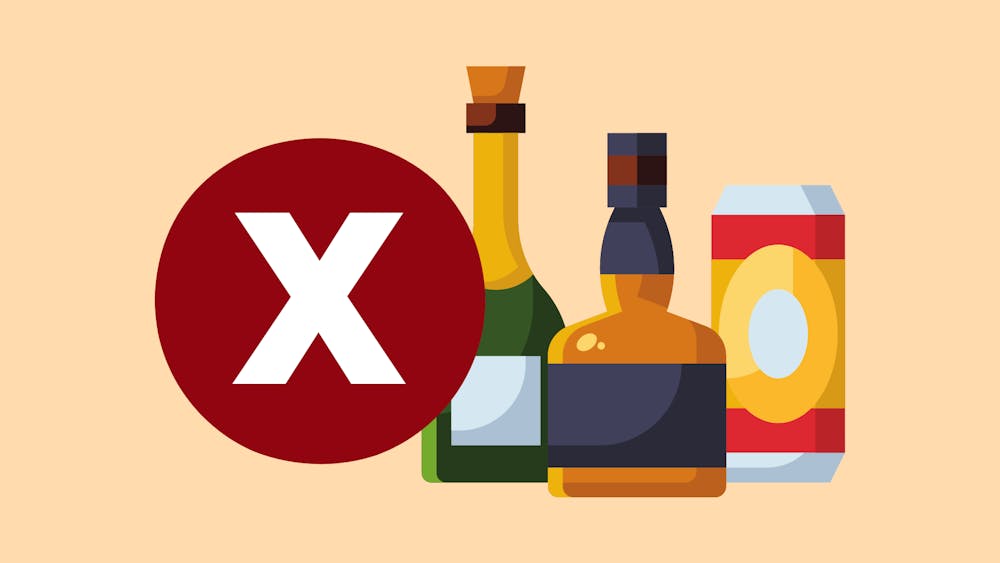This article is part of the Mental Health Collaborative, a project completed by nine North Carolina college newsrooms to cover mental health issues in their communities. To read more stories about mental health, explore the interactive project developed specifically for this collaborative.
Months before coming to Elon University, current senior Syd Danziger made the decision to become sober. Without fully knowing what that would entail, Danziger entered Elon feeling isolated and striving to keep this aspect of their identity quiet.
“It can be really hard to be surrounded by a bunch of young people who haven't come to that conclusion yet or aren't affected by what those habits can do to your life,” Danziger said.
Now, Danziger is the president of Phoenix Free, Elon’s collegiate recovery community. Danziger said despite initial hesitation around making sobriety part of their identity, the organization has been crucial to both their college experience and sobriety.
Elon is one of nine universities in North Carolina receiving funding from the North Carolina Department of Health and Human Services for collegiate recovery programs.
According to the NCDHHS there were 106 alcohol-related deaths in Alamance County in 2021 and 109 the year before. These two years had the highest alcohol-related deaths since 2000.
Danziger said the culture around drinking in college, and Elon specifically, is prevalent, causing people to have certain perceptions of sober students. Danziger said they’ve encountered people who assume they aren’t fun at parties or that they are more uptight.
“When you have a school like Elon, which is very heavy on the alcohol, there are certain stigmas that aren't talked about yet that I'm trying to get out in the open,” Danziger said.
Danziger said Callie Kelly, the Phoenix Free adviser, and Rodney Parks, a registrar and assistant vice president of wellness at Elon, are two of their biggest supporters on campus — and reasons they felt comfortable sharing their story.
“Both of them encouraged me in their own ways without pushing me,” Danziger said, “and kind of reminded me that, regardless of how scary I think my story might be to people, someone's going to need to hear it.”
Kelly is also the adviser for the Alcohol and Substance-free Housing for Elon Students Living-Learning Community. ASHES, located in Global Neighborhood, is an LLC dedicated to first-year and sophomore students who are committed to being substance free. While Kelly said each student has a different reason for sobriety, this shared living space is helpful for building community.
Due to ASHES’ location on the first floor of Jackson Hall, it only has 12 spaces for students. Kelly said this means living in the LLC is competitive, but students not living on the floor are not precluded from attending events. Kelly said she became the adviser for the floor in 2016 and interest in the LLC has grown since then, both in residents and events.
In addition to an adviser, ASHES has a student liaison who communicates directly with Kelly on a regular basis. This position has helped shape the trajectory of the LLC in building connectivity among the floor’s residents through more events such as trips to different parts of the state and monthly dinner meetings.
“Over the years they've shared with me just how integral just that first year on campus was, and being connected to ASHES and how it really set the foundation for them,” Kelly said. “It gave them the support of the community and the confidence to withstand external pressures.”
Phoenix Free has also seen growth during Danziger’s time at Elon. Danziger said when they joined, only they and one other student attended events. Now, they said the organization usually hosts about 10 students for events.
Phoenix Free, while it started as a substance free space, has now evolved to become a more general safe space for students. Danziger said students who are recovering from eating disorders and different traumas all have a place in Phoenix Free.
“This is primarily a mental health space, more than anything else,” Danziger said. “It's about recovering and togetherness and not about judgment. And so, while a lot of our events are substance free, they don't require you to be sober.”
Through both Phoenix Free and ASHES, Kelly said students have been able to find community in a space that can be difficult to be sober in. Kelly said students in ASHES and Phoenix Free don’t have any animosity toward other students who make other choices regarding their alcohol consumption, but having a separate space where students are making the choice not to drink can be a benefit to these members.
“They didn't feel like they were missing out on anything their first year or second year. It was just as fun and memorable without the alcohol,” Kelly said.


